Dr. Frank Chase Jr, Th.D
The scripture says in Proverbs 4;7 that, “wisdom is the principle thing; and therefore get wisdom: and with thy getting get understanding. For centuries, I’m convinced there has been a lack of understanding about the subject of tithing and how the Hebrew people practiced the tradition in a theocracy. It is simply amazing how so many people do not have the slightest understanding of what tithing really is and its content. That’s where this blog post will begin. The word understand based on the scripture text and what does understanding mean in reference to tithing. In Hebrew the word is biynaw. It means a person must actively engage all facilities to get an understanding of a subject using discernment. Understanding is an active precipitative process. Understanding is not just accepting what is taught. For eons, some who claim tithing is money, simply have not engaged their faculties fully to ascertain the empirical meaning of tithing and how the Hebrew people practiced it, but have just accepted the traditions of men who falsely claim that tithing is ten percent of a person’s income. In this post, you will read excerpts from a collection of authors who disagree with the assumption that tithing is monetary. I will start this post with an excerpt from my book, Kleptomaniac: Who’s Really Robbing God Anyway, which has won several book awards over the last few hears. “God gave instructions to Israel on how to redeem people and property; these instructions also targeted those who didn’t want to tithe but desired to exchange the tithe for a price. The Hebrew Israelites kept the tithe but paid money to buyback the tithe with a service fee added. The instructions Yahweh gave to the Israelites allowed them to redeem (or buyback) the crop tithe but not the tithe from the herds or flocks as stated in Leviticus 27:33. As the verse does not confirm to whom the tithe belongs, how would God collect the tithe from the Israelites? Would his hand appear from the heavens to collect the tithe? He said the tithe is holy unto Him and set it apart for His use. To determine who God reserved the tithe for, we need to further investigate the Scripture. So let’s set the record straight. The Bible says the tithe belongs to the Levites, as it is their inheritance from God. Before the law, no tithe command existed and all giving fell under the auspices of gratitude or freewill giving.” (Dr. Frank Chase, Jr., Th.D. Kleptomaniac: Who’s Really Robbing God Anyway? (Kindle Location 2101). Although the masses of christian believers think they have a duty to pay God a mandatory monetary tithe shows that understanding about the subject has been left to private interpretation, speculation, assumption, traditionalism and eisegesis that’s been contorted into man-made doctrinal teachings about tithing. If authors have written books on this subject that present a different analysis, why is it so hard for the average pew sitter to grasp a true understanding of God’s tithe system in Israel. One of the main problems is that when new tithing information gets presented that differs with someone belief system, it causes great cognitive dissonance that many cannot overcome, so they reject truth rather that go through the process of discovering the who, what, when, where and why of tithing. So let’s look at some author excerpts on tithing so you can begin to overcome your private skepticism about the nature and contents of what tithing is. It is believed that Paul took tithes from the people he ministered and preached to, but in fact that would be inconsistent with his Jewish upbringing and frankly a crime since God gave the tithe to the Levites as an inheritance. The Reality is, Paul worked and preached. “Paul’s education was not without its practical side. Acts 18:3 indicates that he was taught a trade, and often in the course of his later missionary labors was enabled by means of it to maintain himself and his companions. The making of tent cloth and sail cloth of goats’ hair was especially practiced in Cilicia, the province in which Tarsus was located, and this trade afterward brought Paul some of his closest friends.” (Excerpt From: Goodspeed, Edgar J. (Edgar Johnson), 1871-1962. “Paul.” iBooks.) In my book Kleptomaniac: Who’s Really Robbing God Anyway, I talk about Paul relationship to the Ekklesia and money or support. Since Paul would have honored his father and Hebrew traditions, it is pure assumption to think Paul accepted monetary tithes based on his cultural background. “He who does not teach his son a profession makes him a good-for-nothing.”96 In other places, it is said that a Jewish man who does not teach his son a trade, teaches him to become a thief. Jewish boys were all compelled to learn trades to support themselves. If you study Jewish culture, there are many examples that show it was considered disreputable if a man did not have a secondary skill outside of teaching Scripture. It was also important to have practical knowledge of a trade, which was necessary and regarded as a requisite to personal independence. Today, many pastors would starve to death because they lack professional skills with which to make a living; this makes them 100 percent co-dependent on others for every aspect of life. Paul would frown on this behavior today.” (Excerpt From: Dr. Frank Chase, Jr., Th.D. “Kleptomaniac: Who’s Really Robbin God Anyway? iBooks). “My curious observation is that Melchizedek did not ask for the tithe either. If this proves difficult to take in, I will advise that you go to the scriptures again. Therefore, it is conclusively clear that no recipient of the Old Testament tithe ever demanded or commanded it as today’s preachers and beneficiaries do. Abram’s tithe was voluntary, while that of the children of Israel was commanded by God on behalf of the Levitical tribe. Not even the priests asked for it. But the cardinal point here is that Abram’s tithe, when put under serious scrutiny, has a lot of flaws as it was given in the flesh as you will discover later. The proof is that it did not continue after the tithers’ names were changed. Therefore, in view of the above observations, I do vehemently believe it is erroneous to attribute the tithe to Abraham. This is a misrepresentation of facts that has lead many of us to believe that Abraham was the first to give the tithe. No, Abraham never gave a tithe, but Abram did as a pagan practice of that time.” (Excerpt From: Leonard Bupanda. “The Tithing Dilemma And The Triumphs Of Love.” iBooks. https://books.apple.com/us/book/the-tithing-dilemma-and-the-triumphs-of-love/id481637695). The point here is that, Abram paid the tithe not Abraham. And you must understand as a biblical student of the scripture understand the difference. It was always a societal custom to pay a war tithe to a king as Abram did with Melchizedek. “Jacob did not have to fulfill his vow to GOD as the vow was conditional upon receiving the land that GoD had promised to him and to his descendants. To suggest from the scriptures quoted thus far that Jacob was governed by a universal tithing law, and that he himself tithed in accordance with such a law, is to add to the Bible something that is not based on a solid foundation of biblical truth. We cannot prove from any of the Scriptural references used so far that tithing is a law that GOD’s people are bound by today. These scriptures should not be used by any church administration in an attempt to extract from their members ten percent of their income. If a universal tithing law were in existence prior to the Mosaic Law Jacob’s children (12 tribes of Israel) would have been taught the importance of tithing, and its application, from childhood. There are no examples within the pages of the Bible that provide any evidence of Jacob’s sons having tithed to the High Priest Melchizedek, on a regular basis or otherwise, prior to the Mosaic Law.” (Excerpt From: Michael Burman. “Iron Sharpens Iron.”) “In ancient Israel, a tithe of all agricultural produce belonged to the Lord; ten percent of the crop was “holy to the Lord” (Leviticus 27:30). Ten percent of the herds were also holy (verse 32). God then gave these tithes to the Levites: “ I give to the Levites all the tithes in Israel as their inheritance in return for the work they do while serving at the Tent of Meeting” (Numbers 18:21). However, Deuteronomy 12:5-7 says that the people were supposed to take their tithes to the festival site, and eat them! “You must not eat in your own towns the tithe of your grain and new wine and oil, or the firstborn of your herds and flocks, or whatever you have vowed to give, or your freewill offerings or special gifts. Instead, you are to eat them in the presence of the LORD your God at the place the LORD your God will choose” (verses 17-18). Deuteronomy 14:23 is similar.” (Excerpt from Michael Morrison, Sabbath, Circumcision, and Tithing). “Deuteronomy 14, verses 22-26, is one of the strangest passages in the Bible. Since carrying the food tithe was a physical burden when one lived too far from Jerusalem, this also proves that tithes were not money which would not create a burden! God actually commanded the purchase of wine or fermented drink for festival celebration. Alcoholics love to discover these texts and try to justify their habits. However, this by no means authorized drunkenness or the abuse of alcohol. These texts describe rejoicing at worship services, not personal drinking abuse. Also, since distillation was not practiced as modern man knows it, the alcohol content was far below what is consumed in our time. Local drinking water was often polluted and unsafe to drink. Also, Scripture provides many texts warning of the evils of alcohol abuse and we cannot claim lack of access to safe drinking water. Eating and drinking the tithe (14:23) at the “place” in the presence of the Lord was not the normal practice, but was reserved for special occasions—the second festival tithe. The importance of these texts is in rejoicing and giving God praise for his blessings.” (Excerpt from Russell Earl Kelly, Should the Church Teach Tithing?) Monetary tithing is thought to be based on accurate tradition, but it is not. True tradition is often thought of as established customs often handed down through the generations and generally observed as customs. However monetary tithing is not a long standing biblical custom handed down through generations. Monetary tithing represents traditionalism which is the dead faith of the living. That means it comes from a place outside of the scripture as a tradition of men dressed up as a commandment of God. “Tithes is plural, which means either there were multiple tithes or it speaks of what was tithed such as crops, cattle, herds and flocks during the planting and harvesting cycles. The types of tithes in the Bible have been named the first tithe, the Levitical tithe, the festival tithe or the second tithe, and the poor tithe. The tithes that Levites received came from crops, grains, fruits, and nuts, which grew from the ground and included every tenth animal from the herd and flock increase. When the Israelites tithed to the Levites, God commanded the Levites in Numbers 18:25 to pay a tenth of the tithe to the high priest, which some call the sub-tithe of the Levitical tithe. The text requires Levites to search for the best from the original tithe and give that portion to Aaron and his sons. As I said earlier, the Levites paid to the high priest a tithe of the tithe. It was the whole tithe that belonged to the Levites. The twelve tribes harvested the land and raised livestock, and it was their responsibility to set aside the tithe of crops and livestock and transfer those commodities to the Levites. Subsequently, the Levites set aside another tenth and transferred it to the high priest. Nowhere does the Bible show people tithing every week in the book of Numbers as people do today. All tithes came from what was planted and harvested and the increase of animals. We know from the text that tithing did not apply to non-farmers in Israel.” (Excerpt from Dr. Frank Chase, Jr., Th.D.. Kleptomaniac: Who’s Really Robbing God Anyway? (Kindle Locations 2207-2217). “Something that very few people have been made aware of is that many of the ancient Israelites were not required to tithe which is something I guarantee you the tithing promoters don’t want people to know because they don’t want anyone exempt from tithing. Now since the tithe was only from land produce and livestock the following people did not have to tithe. The tradesmen who made baskets for harvesting, the cobblers who made shoes for the servants of the field, the carpenters who made the wagons used for harvesting the fields, and fishermen since aren’t a land produce. And by the way, the Lord Jesus Christ who was a carpenter by trade did not tithe.” (Excerpt from Tithing Promoters Big Lies, Benny D. Prince). “Now we will expose another “false” doctrine. It was not the first tenth, but rather the tenth tenth that belonged to Yahweh, which is contrary to what most teach on tithing. Modern clergymen insist that the first tenth always belongs to Yahweh. This is clearly unscriptural and untrue. Scripture reveals it’s the tenth one of the herd that belongs to Yahweh. This is an interesting point, if a herdsman had but nine cattle, he didn’t tithe his cattle at all. Also notice here that Yahweh did not even require the best of the cattle, just the tenth on to pass under the rod even if it was not the best of them all. If you read the whole book of Leviticus, you will not read anywhere about tithing money.” (Excerpt from Eddie Rogers, Tithing in the Church, Is it Scriptural or Unscriptural). “The tithe was taken out of the agricultural product of the land. The tithe came out of the grains, fruits (including wine, oil), nuts herds and flocks Leviticus 27:30;33; Deuteronomy 12:17; 14:22-23. Since Israel’s economy was dominated by agricultural products, it was reasonable a tithe should come out of the products of that economy. The exchange of money was the basis of economic transactions, but money was not tithed. Money in the form of coins was invented in China in 900 BC and in the biblical world about 700 BC.” (Excerpt from James D. Quiggle, Why Christians Should Not Tithe). [In Genesis 14:18-20] “we find Abram giving a tenth of the spoils of battle to a priest named Melchizedek. This was apparently a free-will offering on Abram’s part as there is nothing in the text of a command from God, nor anything from Melchizedek requiring it of him. Note the sequence of events. The offering was given after Abram had defeated the enemy and obtained the spoils, and after he received the bread, wine, and blessing from the priest.” [The smoking gun here is that Abram was blessed first by Melchizedek before he even gave the tithe. In a sense, it was Abram who received the tithe first as the precursor to the Levites and in turn he made an offering Melchizedek God’s victory in battle] (Excerpt from Jeff Farris, God’s Economy: The Tithe and the New Testament Giving). “The fact that the laws of tithing were no longer applicable for the Christian Church (because the Christian ekklesia did not need Levites and Priests performing the rituals of the Temple) now gave people the opportunity for providing free will contributions (that is, offerings of their own volition) for the upkeep of the ekklesia and the teaching of the Gospel of Christ to the world. Look at the advantage this gives the Christian. While an Israelite in Temple times when the sacrificial services required the Levites and Priests, the Israelite would not be giving free will offerings until he or she had paid the tenth to the Levites. Now it is different. The rules are now changed. Since tithing is not applicable for members of the Christian ekklesia, all the money (and this includes all the increase of crops and animals) belongs to the Christian who produces the income. This means 100% of his or her income still belongs to the income producer as far as God is concerned. Now some of that money will go to pay taxes (and the Bible states that taxes should be paid—Romans 13:6–7), but as far as God is concerned, 100% of the money Christians earn is theirs. This means that when a Christian gives the first 1% of income to support the work of the Gospel, that 1% is from the start reckoned as a free will offering. If one gives 5% or even 10% (or whatever one gives), it is ALL a free will offering.” (Excerpt from Ernest L. Martin, The Tithing Dilemma). Numbers 18:21 “Behold, I have given the children of Levi all the tithes in Israel as an inheritance in return for the work which they perform, the work of the tabernacle of meeting.” The tithe was to go to the children of Levi, the Levites, that were making up the priest tribe of Israel, the 1/12 of it. It was to be their reward for the service of the tabernacle and later of the temple. Numbers 18:31 says it clearly: “for it is your reward for your service in the tabernacle of the congregation”. It was to be counted by them as “the grain of the threshing floor, and as the fullness of the winepress.” In fact the Levites had to give their own tithe from this. This was given to Aaron and was to be the Lord’s heave offering. Many take the above passage and they wrongly try to apply it in the New Testament era, in our age, saying that we should continue to tithe to pay the salaries of the priests, pastors and the clergy in general. This view is distorted because in the New Testament there is simply no clergy and priests. As Peter and John tell us, speaking to us, the believers in the Lord Jesus Christ: I Peter 2:5 “you also, as living stones, are being built up a spiritual house, a holy priesthood, to offer up spiritual sacrifices acceptable to God through Jesus Christ.” (Excerpt from Anastasios Kioulachoglou, Tithing Giving, and the New Testament, Bringing Centuries-long practices and traditions to the light of scriptures). “The word tithe in Hebrew means ma`aser {mah-as-ayr’} or ma`asar {mah-as-ar’} and (in pl.) fem. ma`asrah {mah-as-raw’}. From #06240, it literally means a tenth or tenth part. The word “tithe” is Strong’s #4643.16 The word does not mean offering, gift, or sacrifice, as it is understood today. A tenth or tenth part does not tell you what the tithe is. The makeup of the tithe is defined by the context within the verses that describe tithing. The Hebrew language is straightforward when it says a tithe is a tenth part and not 10 percent. The authentic sanctioned biblical tithe is food. Any extra-biblical definition that inserts money as a tithe is out of context. That means it is unbiblical to include non-food items. Israel’s tithe existed in a pre-monetary agricultural theocracy and is inextricably tied to land not money. Since “maaser” refers to everything eatable, then all tithes should derive from harvests and livestock to support the sacrificial system managed by high priests and Levites. From Genesis to Revelation, the Bible never mentions tithing on denarius, bekahs, drachmas, gerahs, talents, mites, shekels, or silver. No reasonable person could study tithe verses in the Bible and then on purpose ignore that the tithe was strictly land-based and never income based. Since the correct biblical definition of the tithe is agrarian, no one should ever associate the word tithe with money.” (Excerpt From: Dr. Frank Chase, Jr., Th.D. “Kleptomaniac: Who’s Really Robbing God Anyway?.” iBooks. Take a look at the latest book review from Elite Choice Awards below This is just a short review of what other authors have written about tithing. Though the masses of Christians still do not believe tithing is not money, it means that those of us who know the truth based on scholarship, hermeneutics, exegesis and the land, language and literature of the Hebrew people must continue press the issue for proper scriptural interpretation of the word tithe. In a world where truth does not matter anymore, this tithing truth can save someone from financial ruin from generation to generation. So let Kleptomaniac: Who’s Really Robbing God Anyway inform you about who the real God robbers are and how to become unshackled from cognitive dissonance. If every author who disagrees with the current doctrine of monetary tithing then those whose support monetary tithing must present empirical evidence that the Hebrews and the first century church was commanded by God to pay money as a tithe. God’s Tithe Law of Decent Click Image. Go to https://www.fcpublishing.com not tithnomore Edgar Johnson
Dr. Frank Chase Jr, Th.D
Leonard Bupanda
Michael Burman
Michael Morrison
Russell Earl Kelly
Dr. Frank Chase Jr, Th.D
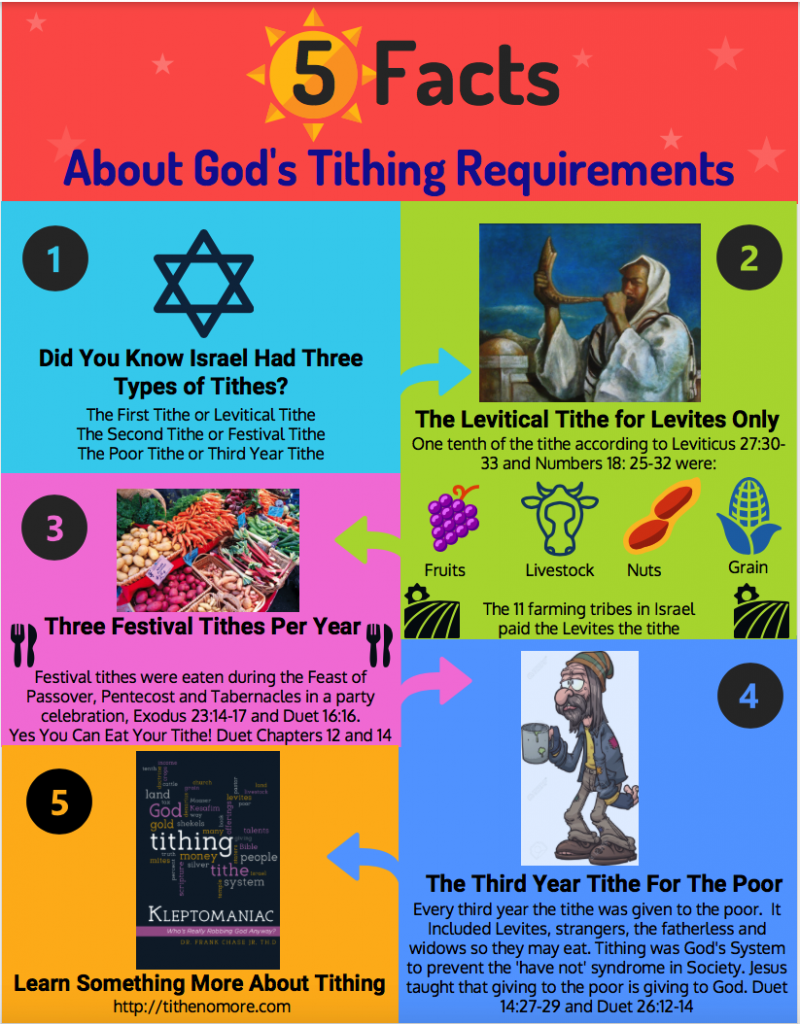 Click Image to Learn More About Storehouse Tithing. Go to https://www.fcpublishing.com not tithenomore
Click Image to Learn More About Storehouse Tithing. Go to https://www.fcpublishing.com not tithenomoreBenny D. Prince
Eddie Rogers
James D. Quiggle
Ernest L. Martin
Anastasios Kioulachoglou
Dr. Frank Chase Jr, Th.D
Latest Book Review for Kleptomaniac: Who’s Really Robbing God Anyway
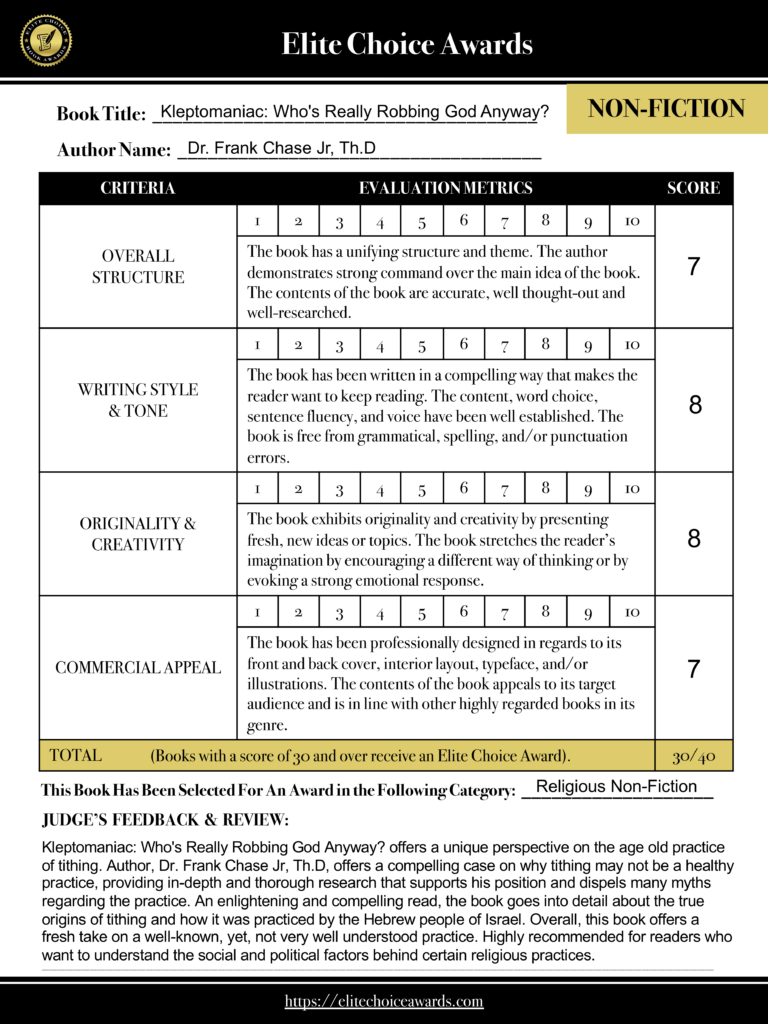











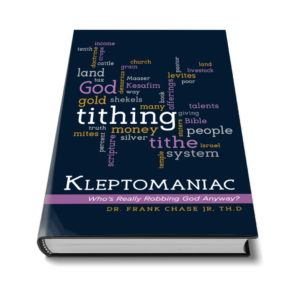
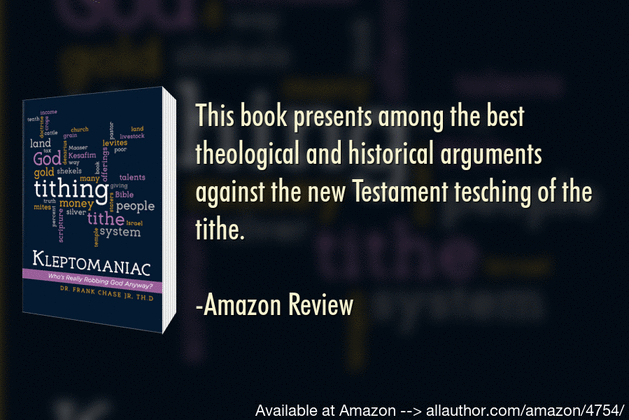
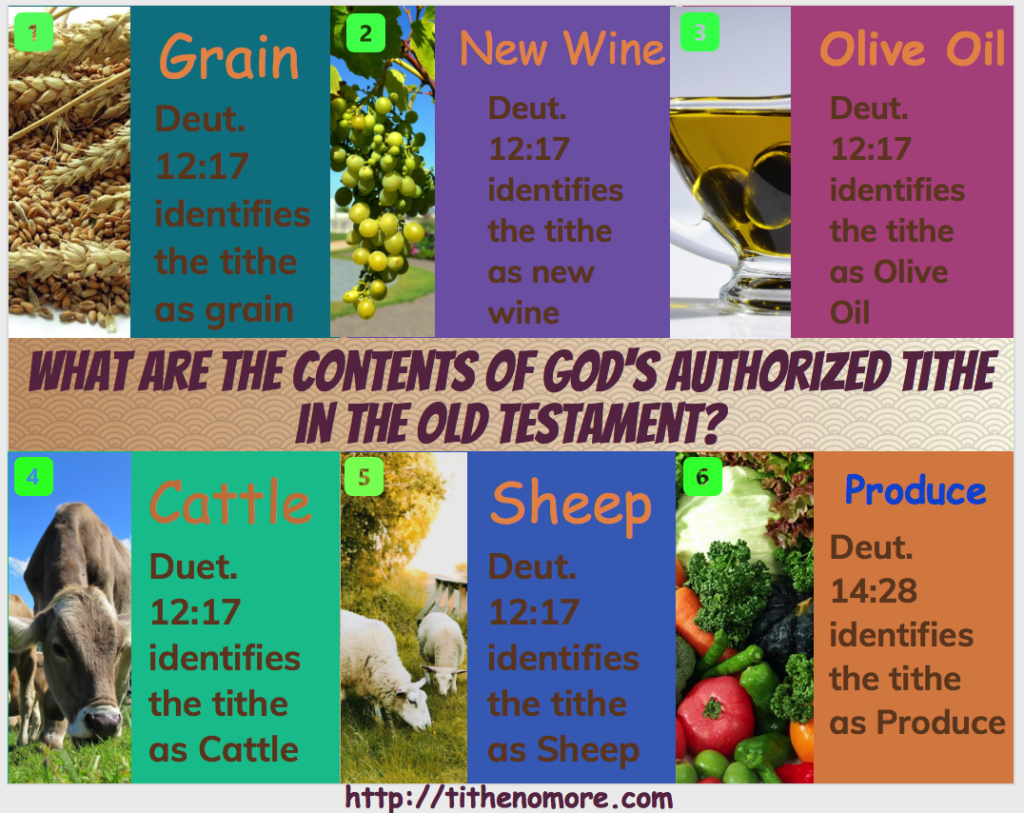


Recent Comments